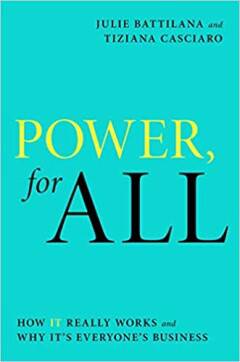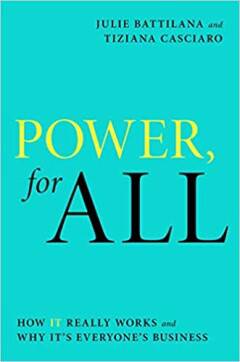
- Afhalen na 1 uur in een winkel met voorraad
- Gratis thuislevering in België vanaf € 30
- Ruim aanbod met 7 miljoen producten
- Afhalen na 1 uur in een winkel met voorraad
- Gratis thuislevering in België vanaf € 30
- Ruim aanbod met 7 miljoen producten
Zoeken
Power, for All
How It Really Works and Why It's Everyone's Business
Julie Battilana, Tiziana Casciaro
€ 23,95
+ 47 punten
Uitvoering
Omschrijving
“A remarkably insightful read on what power is, how it’s gained and lost, and how it can be used for good. The masterful analysis by two leading experts will make you rethink some of your most basic assumptions about influence” (Adam Grant, #1 New York Times bestselling author of Think Again).
Power is one of the most misunderstood—and therefore vilified—concepts in our society. Most people assume power is predetermined by personality or wealth, or that it’s gained by strong-arming others. Many write it off as inherently corrupt or “dirty” and want nothing to do with it. But as pioneering researchers Julie Battilana and Tiziana Casciaro deftly show in Power, for All, power is the ability to influence someone else’s behavior. This influence is derived from having access to valued resources, which anyone can have, regardless of their income or status in life. Everyone has a resource to offer, so everyone has access to power.
Battilana and Casciaro offer a timely, democratized vision of power. While hierarchies tend to stay in place because power is often sticky, by agitating, innovating, and orchestrating change, they show how those with less power can challenge established structures to make them more balanced. They teach readers how to power-map their workplace to find who can create real change at work, plan for and cause sustaining power shifts, and understand the five motivations for seeking power—money and status, but also autonomy, achievement, affiliation, and morality. They explore how these dynamics play out through vivid storytelling: as Donatella Versace successfully leads her brother’s company after his death—despite having a title, but little influence; what social movements can learn from youth climate activists and how they can go farther; and how a manager can gain the trust of skeptical employees and improve the workplace. Ultimately, Power, for All demystifies the essential mechanisms for acquiring and using power for all people.
Concentrated, accessible, and life-changing, Power, for All is the definitive guide to understanding and navigating power in our relationships, organizations, and society.
Power is one of the most misunderstood—and therefore vilified—concepts in our society. Most people assume power is predetermined by personality or wealth, or that it’s gained by strong-arming others. Many write it off as inherently corrupt or “dirty” and want nothing to do with it. But as pioneering researchers Julie Battilana and Tiziana Casciaro deftly show in Power, for All, power is the ability to influence someone else’s behavior. This influence is derived from having access to valued resources, which anyone can have, regardless of their income or status in life. Everyone has a resource to offer, so everyone has access to power.
Battilana and Casciaro offer a timely, democratized vision of power. While hierarchies tend to stay in place because power is often sticky, by agitating, innovating, and orchestrating change, they show how those with less power can challenge established structures to make them more balanced. They teach readers how to power-map their workplace to find who can create real change at work, plan for and cause sustaining power shifts, and understand the five motivations for seeking power—money and status, but also autonomy, achievement, affiliation, and morality. They explore how these dynamics play out through vivid storytelling: as Donatella Versace successfully leads her brother’s company after his death—despite having a title, but little influence; what social movements can learn from youth climate activists and how they can go farther; and how a manager can gain the trust of skeptical employees and improve the workplace. Ultimately, Power, for All demystifies the essential mechanisms for acquiring and using power for all people.
Concentrated, accessible, and life-changing, Power, for All is the definitive guide to understanding and navigating power in our relationships, organizations, and society.
Specificaties
Betrokkenen
- Auteur(s):
- Uitgeverij:
Inhoud
- Aantal bladzijden:
- 288
- Taal:
- Engels
- Reeks:
Eigenschappen
- Productcode (EAN):
- 9781982181109
- Verschijningsdatum:
- 31/08/2021
- Uitvoering:
- Paperback
- Afmetingen:
- 230 mm x 154 mm
- Gewicht:
- 316 g

Alleen bij Standaard Boekhandel
+ 47 punten op je klantenkaart van Standaard Boekhandel
Beoordelingen
We publiceren alleen reviews die voldoen aan de voorwaarden voor reviews. Bekijk onze voorwaarden voor reviews.











